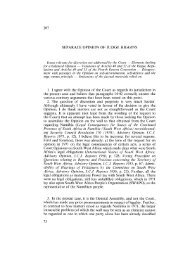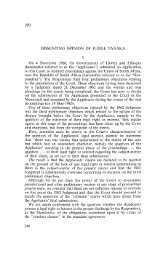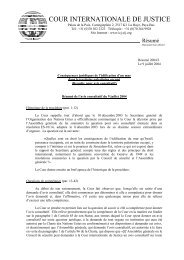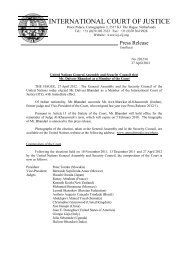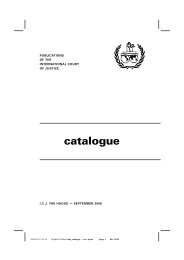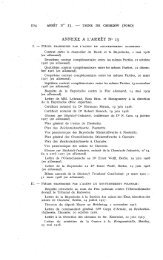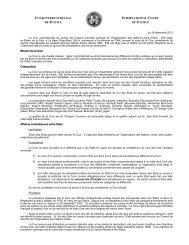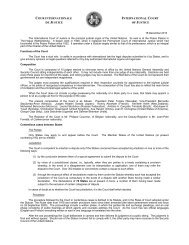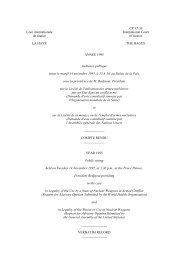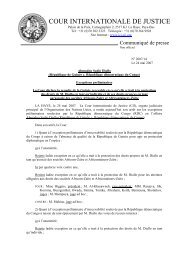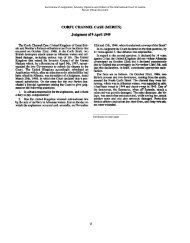botswana/namibia - Cour international de Justice
botswana/namibia - Cour international de Justice
botswana/namibia - Cour international de Justice
Create successful ePaper yourself
Turn your PDF publications into a flip-book with our unique Google optimized e-Paper software.
729. In general, it is difficult to see any relevance in the episo<strong>de</strong>. The documents certainly<br />
assume that the process of cultivation had no legal consequences in the context of title by<br />
virtue of public <strong>international</strong> law.<br />
(iv) The 1909-1914 Negotiations<br />
730. The Namibian Memorial invokes the Anglo-German negotiations of 1909 to 1914 as the<br />
basis for an argument that, because the British Government addressed the Andara question in<br />
<strong>de</strong>tail, its silence in relation to the boundary in the Chobe River sector 'gives rise to<br />
presumption of acquiescence and recognition of the alignment in the second sector': Namibian<br />
Memorial, pp. 105-9, paras. 263-73; at page 109, para. 273.<br />
731. It has been shown earlier (Chapter 1) that the issue of 'main channel' was not the subject<br />
of negotiations between the two Governments. Moreover, the internal British opinion was that<br />
the northern channel constituted the 'main channel'. And, in any case, there could be no<br />
'acquiescence and recognition of the alignment' unless the British Government believed that<br />
Kasikili/Sedudu Island was un<strong>de</strong>r German occupation.<br />
732. There was no evi<strong>de</strong>nce of German occupation. Captain Eason did not report any German<br />
activity. Moreover, Captain Eason, like other British officials over the years, consi<strong>de</strong>red that<br />
the northern was the main channel.<br />
733. It is also to be recalled that, in the course of the correspon<strong>de</strong>nce of 1948 to 1951, the<br />
British and South African interlocutors make no reference to the period 1909 to 1914: see<br />
below. There is some evi<strong>de</strong>nce (Chapter 1) that, if an arbitration had taken place, this might<br />
have inclu<strong>de</strong>d the 'main channel' issue: but this evi<strong>de</strong>nce is inimical to any theory of British<br />
acquiescence of any kind.<br />
(v) Transactions Relating to the Andara Problem, 1930-1932<br />
734. In the period 1930 to 1932 the British and South African Governments were involved in<br />
a series of transactions relating to the siting of the western terminal beacon of the northern<br />
boundary of the Caprivi Zipfel on the line from Andara to Katima Mulilo: see above, Chapter<br />
1, para. 40.<br />
735. It is significant that, during this process of resolving residual issues relating to the Anglo-<br />
German Agreement, the South African Government ma<strong>de</strong> no reference to any problem<br />
concerning Kasikili/Sedudu.<br />
(vi) The Correspon<strong>de</strong>nce of 1948 to 1951 between the British and South African<br />
Governments<br />
736. The hollowness of the assertions relating to 'acquiescence, acceptance and recognition' in<br />
Chapter IV of Part Two of the Namibian Memorial is particularly evi<strong>de</strong>nt in the context of the<br />
correspon<strong>de</strong>nce between the British and South African Governments in the period 1948 to<br />
1951. In this correspon<strong>de</strong>nce South Africa issued a challenge to the status quo in the form of a<br />
request for a modification of the legal status quo. The British Government upheld the standard<br />
view that the northern and western channel constituted the 'main channel' for the purposes of<br />
the Anglo-German Agreement. The outcome was an exclusively political modus vivendi.



